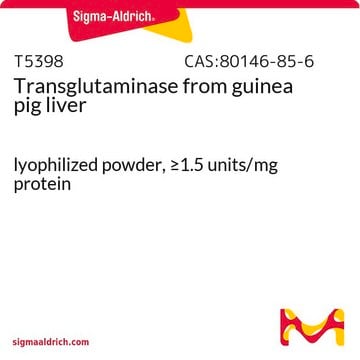E9251
Ecteola Cellulose
coarse
Synonym(s):
Epichlorohydrin triethanolamine–cellulose
Sign Into View Organizational & Contract Pricing
All Photos(1)
About This Item
Recommended Products
particle size
, coarse
capacity
~0.3 meq/g
Looking for similar products? Visit Product Comparison Guide
Application
Ecteola cellulose is used in affinity chromatography, protein chromatography and heparin applications. Ecteola cellulose has been used in studies to develop methods for evaluating sugar concentrations and to detect inhibition of clot strength in blood samples.
Storage Class Code
11 - Combustible Solids
WGK
WGK 3
Flash Point(F)
Not applicable
Flash Point(C)
Not applicable
Personal Protective Equipment
dust mask type N95 (US), Eyeshields, Gloves
Certificates of Analysis (COA)
Search for Certificates of Analysis (COA) by entering the products Lot/Batch Number. Lot and Batch Numbers can be found on a product’s label following the words ‘Lot’ or ‘Batch’.
Already Own This Product?
Find documentation for the products that you have recently purchased in the Document Library.
P E Greilich et al.
Anesthesia and analgesia, 84(1), 31-38 (1997-01-01)
The monoclonal antibody, c7E3 Fab, binds to the platelet surface fibrinogen receptor (GPIIb/IIIa), inhibiting platelet aggregation and clot retraction. We performed an in vitro study to assess the ability of a modification of the thromboelastograph (MTEG) to detect inhibition of
Ana Carolina Campi-Azevedo et al.
Journal of immunological methods, 448, 9-20 (2017-05-18)
Technological innovations in vaccinology have recently contributed to bring about novel insights for the vaccine-induced immune response. While the current protocols that use peripheral blood samples may provide abundant data, a range of distinct components of whole blood samples are
A Calatroni et al.
Clinica chimica acta; international journal of clinical chemistry, 206(3), 167-180 (1992-03-31)
Acid glycosaminoglycans were isolated from normal human plasma: (a) following fractionation of plasma (with protease inhibitors) on Sephadex G-200; (b) by ultrafiltration through membranes with retention of molecules above 50 kDa, with and without previous addition of NaCl, Triton X-100
G M Campo et al.
Journal of chromatography. B, Biomedical sciences and applications, 765(2), 151-160 (2002-01-05)
An improved isocratic high-performance liquid chromatography (HPLC) method for the analysis of L-(-)-fucose. D-(+)-galactosamine, D-(+)-glucosamine, D-(+)-galactose, obtained by hydrolysis of glycosaminoglycans (GAGs) and D-(+)-glucose and D-(+)-mannose is described. The presence in circulation of GAGs, acid polysaccharide sequences of alternate monosaccharide
A M van den Besselaar et al.
Thrombosis and haemostasis, 63(1), 16-23 (1990-02-19)
Five different APTT-reagents, two amidolytic anti-IIa assays, one amidolytic anti-Xa assay, and one coagulometric anti-Xa/anti-IIa assay were used to assess the effect of heparin in patients treated for venous thromboembolic disease. Good correlations were observed between log-transformed APTTs determined with
Our team of scientists has experience in all areas of research including Life Science, Material Science, Chemical Synthesis, Chromatography, Analytical and many others.
Contact Technical Service







